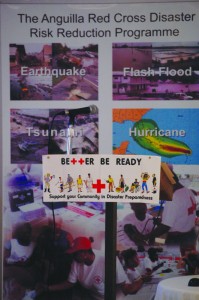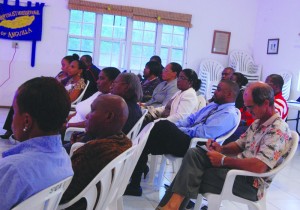
Norwegian playwright Henrik Ibsen once said that “a community is like a ship; everyone ought to be prepared to take the helm.” His idea of community duty as a body of work, instead of an individual plight, is the same concept the Anguilla Red Cross (ARC) presented at its Disaster Risk Reduction Launch (DRR) on July 31st 2012.
The program began a little behind schedule due to some extremely heavy rain activity which seemed to coincide with the importance of the issue at hand. Once the proceedings were underway guests and community members were welcomed by Disaster Risk Reduction Manager, Trevor Queeley. In his opening remarks, Mr. Queeley stressed the importance of the programme’s goal to strengthenAnguillawith regard to disaster response and rapid recovery. The ARC plans to implement the DDR initiative as a 3-5 year long comprehensive disaster preparedness intervention. TheCaribbeanis a natural disaster prone region, thus reaching and preparing vulnerable communities is imperative for more resilient disaster retaliation.

John Bales, the Regional Programme Coordinator of the British Red Cross, provided a programme overview in a PowerPoint presentation and spoke on the activities of the DRR programme. He stated that the programme was one of the many initiatives being implemented by the British Red Cross in all theBritishOverseasTerritoriesof theCaribbean. In addition, he highlighted some key aspects of the programme which are to provide First Aid training, solicit volunteers for emergency response teams and implement community mobilization. The ARC will work closely with existing programmes and community organizations as well as with government agencies. Mr. Bales did make note, however, that though government participation is quite welcome there must be more than just government participation. When disasters strike having dual roles is actually unproductive because being in more than one place in an emergency is impossible – meaning that some needs will be unmet. “The government can only do so much” he said, adding that “we are all our brother’s keeper” and must develop the people capacity to protect one another.
President Susan Hodge presented the official launch speech in which she stated that “the DRR programme is not just about the regular, if you can call them that, hazards that we have come to identify with, but on risk reduction on a whole: wearing seat belts, water safety, child car seats, knowing your highway code (even if you only ride a bicycle), risk reduction in terms of HIV/AIDS, health and safety in the home and workplace, swimming, boat-racing. In our everyday lives we are surrounded by things and situations that can be hazardous and dangerous to our health and well-being. We need to be aware of the hazards around us and how to reduce or remove the impact they may have.”
If you would like to be a part of the DRR programme, volunteers as young as 13 will be accepted. The ARC is looking for all types of volunteers from various fields. If you would like additional information please contact the ARC office via phone (264) 49-0406 or via email (info@anugillaredcross.org.ai).
Photos and article by Jemila Morson








